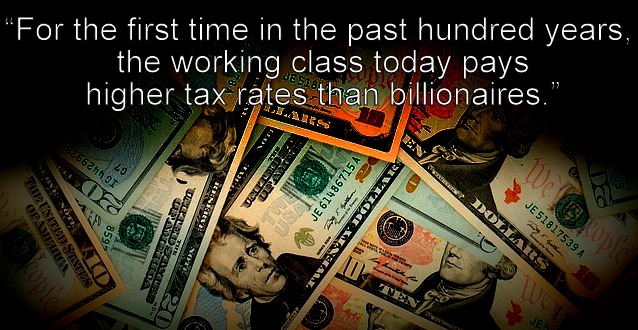Income and Wealth Inequality and Taxes

2019, The Wall Street Journal published an article in its opinion section written by Alan Blinder, a professor of economics and public affairs at Princeton. Blinder’s opinion piece references a new book by two economists at the University of California, Berkeley, Emmanuel Saez and Gabriel Zuchman.
Saez and Zucman traced tax records back to 1913, the effective date of the 16th Amendment allowing a federal income tax.
According to Saez and Zuchman, the average tax rate (taxes as a percentage of income) on the top of 0.1% of income earners rose from 19% in 1913 to an average of 53% between 1930 and 1974. After that, the tax rate on the upper 0.1% has fallen to about 31%. For the 400 highest earners, whose taxes were traced back to 1960, the tax rate fell from 56% to 23% today. These 400 highest earners earn on average more than $450 million a year. Working-class Americans now pay around 25% of their income in taxes while the richest 400 pay 21%.
According to the data, “income equality in America now stands at or just a tad below, an all-time high.” Income inequality has been rising for almost 40 years. “For the first time in the past hundred years, the working class today pays higher tax rates than billionaires.”
The ultrarich earn most of their wealth through investments rather than paychecks. Therefore, in order to be completely fair to them, the researchers attributed to shareholders all taxes actually paid by corporations.
The bottom line is that the 2001 and 2003 tax cuts of George W. Bush and particularly the Trump tax cuts of 2017 were somewhere between ill-advised and unconscionable. All of these tax cuts were justified by the “trickledown”/”a rising tide floats all boats” argument. The evidence is overwhelming that these arguments are fallacious.
To make matters worse, on October 31, 2019, the Treasury Department announced it was rolling back Obama-era regulations intended to stop corporate inversions. An inversion occurs when a U.S. corporation merges with a foreign corporation in order to take advantage of a lower tax rate in a foreign country. This tax gimmick allows a domestic company to masquerade as a foreign company. The Obama regulations had mostly shut down these inversions. Trump justified corporate tax cuts based upon the argument that U.S. corporate tax rates were too high compared to the rest of the world and that lowering the rate would make inversions unnecessary, spur investment in the U.S. and increase domestic wages. Not only did corporations not invest their tax savings in the U.S. or substantially raise wages, they primarily used the savings to pay dividends and buy back their own stock (increasing its value), further enriching the most wealthy. Trump now intends to grant corporations the best of both worlds – low domestic taxes and, if that’s not low enough, you can pretend to be a foreign corporation through an inversion. Also, corporations rarely pay taxes at the maximum rate. For example, Amazon, maybe the most valuable company in the world, paid -0- taxes in 2018. Amazon did this by exploiting foreign tax havens and tax avoidance strategies. Amazon did this despite the fact it has enormously valuable contracts with the federal government.
We should also consider the question of who benefits and who bears the costs of the Trump trade war with China. Trump has a very good point when he accuses China of theft of intellectual property and forcing U.S. companies to share technology if they want to do business in China. Theft and forced technology transfer rightly offend our sense of right and wrong. But, the trade war is being fought at the expense of ordinary consumers, farmers and small businesses. If these big corporations don’t like the way China does business, they have the option to not do business there. On the other hand, if they want the might and power of the U.S. government and the U.S. economy to leverage a better deal for them, shouldn’t they will be willing taxpayers?
If the wealthy don’t pay their fair share of taxes and corporations don’t pay theirs, the burden inevitably falls to everyone else.